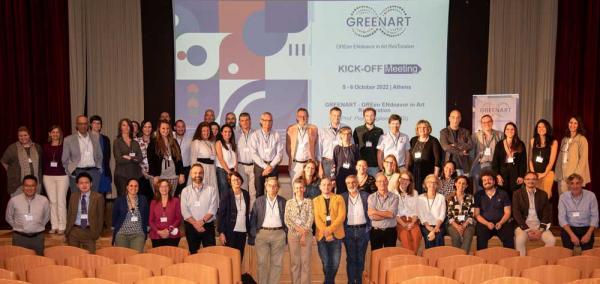In October of this year, we mark the culmination of the inaugural year of the GREen ENdeavor in Art Restoration (GREENART) Project. This three-year effort, funded by the European Commission for Horizon Europe 2020, aims to enhance the sustainability of art restoration practices while minimizing their environmental impact. GREENART is a collaborative initiative, uniting 28 institutions across Europe, Asia, and the Americas. It brings together experts from diverse fields, including scientists, researchers, and conservators from academic institutions, museums, and private enterprises. This multifaceted collaboration exemplifies the project's ambition to refine and establish environmentally friendly practices in art restoration.
LACMA stands as one of the three American institutions, alongside The Metropolitan Museum of Art and the Museum of Fine Arts, Houston, participating in the GREENART Project, which spans from October 1, 2022, to September 30, 2025. At its core, this initiative delves into the exploration of ecologically conscious, sustainable materials for the preservation of cultural heritage.
The project's overall goal is to develop and implement environmentally friendly tools and materials for conservation, which is achieved through a combination of research, development of new materials, and education and training for art restoration professionals. The GREENART Project has four main areas of focus, and LACMA’s conservation team is involved in all of them:
-
Development of sustainable materials and techniques for conservation involves the research and development of sustainable methods and materials, including new biodegradable solvents and cleaning agents, green cleaning systems, protective coatings, consolidation, green packaging materials, and green tech.
-
Life cycle and sustainability assessment focuses on assessing these newly developed materials' environmental impact and identifying areas for improvement.
-
Education and training programs for conservation professionals provide training programs and resources for art restoration professionals to adopt sustainable practices.
-
Exploitation, communication, and dissemination of information: includes OpenAccess publication and app development for raising public awareness and communicating and disseminating information about the project's results.
LACMA's “GREENART team” includes paintings conservator Gerrit Albertson, objects conservator Jessica Chasen, scientist Ashley Freeman, and head scientist Laura Maccarelli. Together, they are currently beta-testing environmentally friendly alternatives to conventional cleaning systems used in conservation, which typically involve petroleum-based solvents, surfactants, and gels. LACMA will be assessing the effectiveness of new cleaning materials on mock-ups of fluorescent paints as well as on case study objects drawn from the museum collection. The case studies include polychrome Tibetan furniture with heavy surface soiling and restoration coatings as well as painted wood components of the Damascus Room.
In addition, this team is actively contributing insights for the development of more sustainable packing materials, including bio-plastics and multifunctional foams. They're also exploring the potential of nanoparticles and self-regenerated silk fibroin dispersions as substitutes for the synthetic consolidants commonly employed in restoration practices.
The GREen ENdeavor in Art Restoration project addresses the urgent need for more sustainable practices in the conservation field. By developing and implementing sustainable methods and materials, the project aims to reduce the environmental impact of conservation and promote a more sustainable future for this field.



